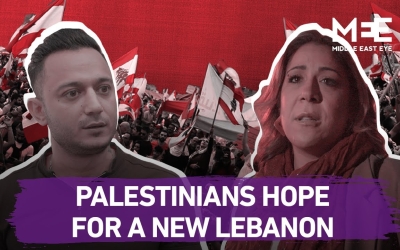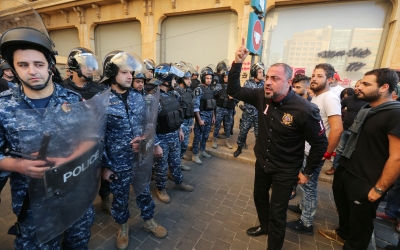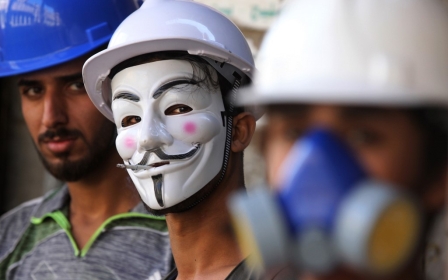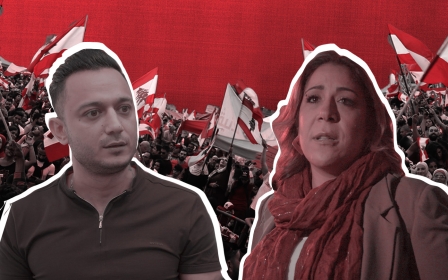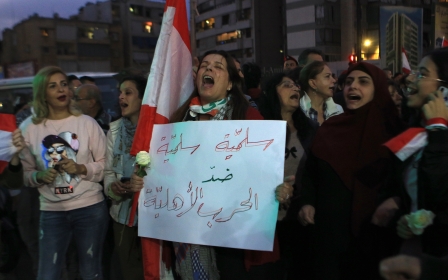Lebanon: Party supporters clash with army after anti-Shia video
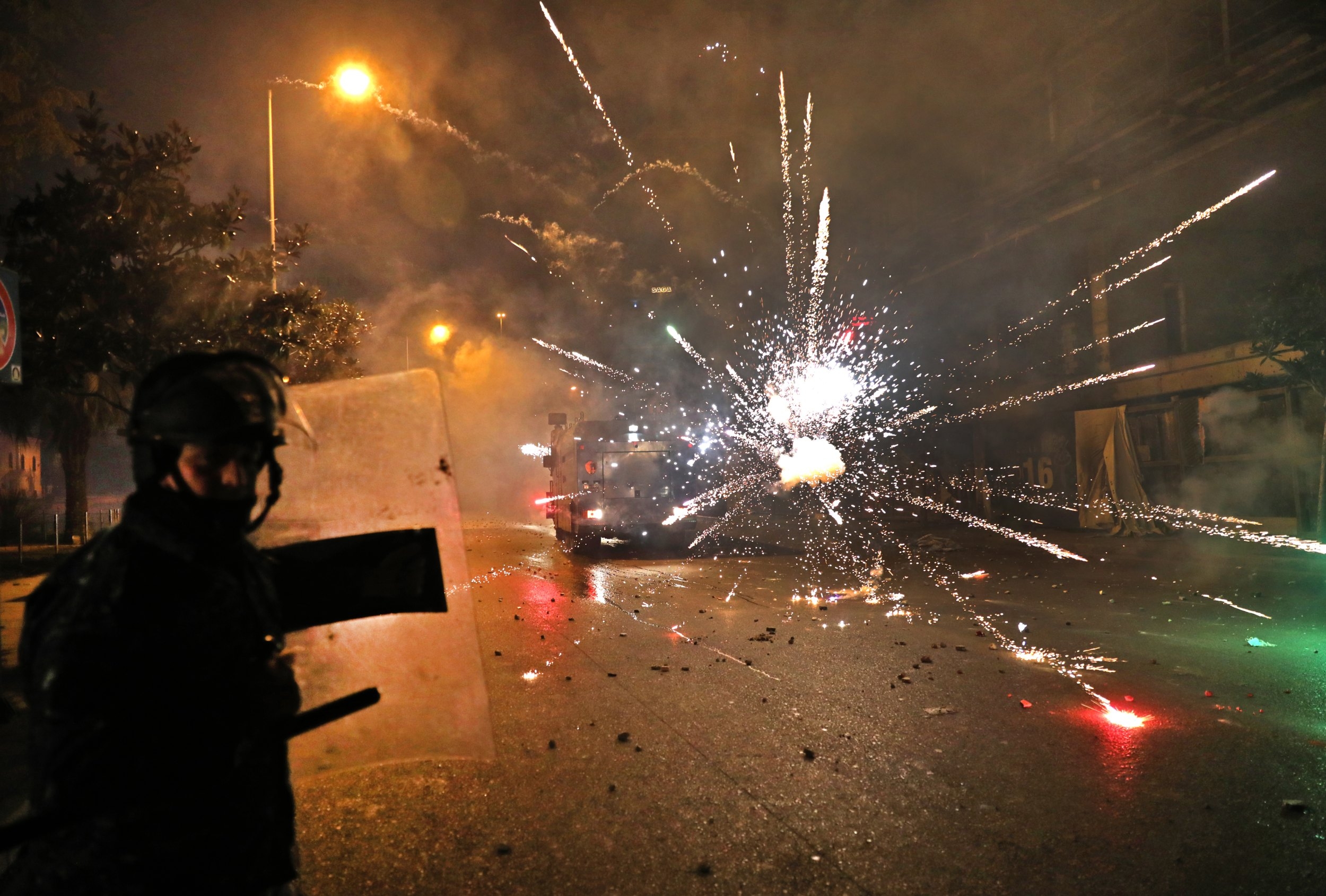
A video of a Lebanese man making anti-Shia comments circulating on social media led to clashes across downtown Beirut on Monday night, raising tensions amid a two-month-long uprising in the country.
Angry young men carrying a banner reading “Oh, Hussein” - in reference to the grandson of Prophet Muhammad, an important figure in Shia Islam - headed towards downtown Beirut, the epicentre of the protest movement in the Lebanese capital, from the adjacent neighbourhood of Khandaq al-Ghamiq.
The crowd burned down protester tents and set civilian cars on fire in the vicinity, as clashes went on past midnight until about 4am.
Internal Security Forces (ISF) and Lebanese Army troops present in large numbers struggled to contain the situation, as the crowd threw firecrackers at forces who fired tear gas.
Several security forces officers were reportedly wounded during the clashes. Lebanese Civil Defense said they treated 43 wounded, transferring 23 to hospitals.
New MEE newsletter: Jerusalem Dispatch
Sign up to get the latest insights and analysis on Israel-Palestine, alongside Turkey Unpacked and other MEE newsletters
Trying to quell the situation, the imam of the Khandaq al-Ghamiq mosque urged the young men to return home through its loudspeakers. “If the youth love Hussein and Ali, then they should leave the streets, because Hussein would not approve such acts,” the imam said.
The leadership of Hezbollah and the Amal Movement also called on their supporters to leave the streets.
Meanwhile, protesters expressed fears that the incident might be used to smear their movement by association by accusing it of targeting a particular sect - as partisans of Hezbollah and Amal have regularly targeted the demonstrations.
Anti-Shia video posted ‘under the influence’
The man who sparked unrest with his video was identified as Samer Saidawi, who apologised in a later video.
Originally from the northern city of Tripoli but currently residing in Greece, Saidawi said the video was disseminated without his consent after a heated exchange with a friend.
“I was not insulting any religion, only the thugs from Dahieh,” Saidawi said, referring to Hezbollah and Amal supporters from the southern suburbs of Beirut, who often clash with protesters. “He then agitated me… insulting my religion and sect several times."
Saidawi apologised to Shia and Sunnis Muslims and “any other sect I may have insulted”. “I was drinking… I was under the influence,” he said.
Speaking to local television station Al-Jadeed, a man who said he was Saidawi’s uncle said his family “condemns what was said by this ignorant boy”.
Responding to the incident, Hezbollah MP Ibrahim Moussawi said in a tweet that the party would not be “provoked by insults”.
“Our prophet, imams, and symbols have been insulted for many years, and we were patient with the ignorant, the hateful, and the malicious,” he added.
Meanwhile, Future Movement MP Dima Jamali from Tripoli denounced Saidawi’s comments, and said he does not represent the northern Lebanese city. “Tripoli is coexistence,” Jamali said, condemning anyone trying to sow discord among the Lebanese.
Fears of tensions
Two social media trends occupied Lebanese online spaces in the wake of the video’s release. The hashtag “Except for Zahra”, referring to the prophet's only daughter, was heavily used by Lebanese who were dismayed by the video.
Some accused the protest movement, which has notably called for an end to corruption and sectarianism, of sharing Saidawi’s negative view of Shia Lebanese. Tripoli, where Saidawi is from and where large protests are taking place, is a Sunni-majority city.
However, people supportive of the uprising reacted by saying Saidawi’s comments were not representative of protesters.
Using the trending hashtag “No to Sedition”, many demonstrators expressed fears that sectarian narratives could emerge following this incident and undermine the unity of the “thawra” - revolution.
While clashes were ongoing nearby, protesters meanwhile chanted “Tripoli and Dahieh are hand-in-hand”, rejecting attempts to divide Sunnis and Shias.
Tensions have mounted between protesters in downtown Beirut and Amal and Hezbollah supporters in Khandaq al-Ghamiq, as altercations have taken place since the onset of the uprising on 17 October.
In several instances, the Hezbollah and Amal partisans have burned down protest tents and attacked demonstrators for denouncing parliament speaker and Amal party leader Nabih Berri and Hezbollah's secretary-general Sayyed Hassan Nasrallah.
Protesters have rejected accusations that their movement is exclusively targeting Shia political movements, as demonstrators have denounced parties of all religious affiliations for their clientelist approach to politics at the expense of the greater national good.
Since 17 October, countrywide protests have swept across Lebanon, calling for an end to economic corruption, an independent judiciary, and the downfall of the country’s sectarian political system.
Meanwhile, Lebanon’s economic crisis continues to worsen, with the Lebanese lira’s value inflating against the pegged US dollar and banks struggling to keep currency.
Shortage of US dollars has to led to import stagnation, a thriving black currency exchange rate, and an unprecedented inflation in costs of goods and services.
Saad Hariri resigned as prime minister in late October, but political leaders continue to struggle to agree on a successor.
Many protesters advocate for a downsized independent government that would focus on the economic crisis and prepare for early parliamentary elections.
Middle East Eye delivers independent and unrivalled coverage and analysis of the Middle East, North Africa and beyond. To learn more about republishing this content and the associated fees, please fill out this form. More about MEE can be found here.


